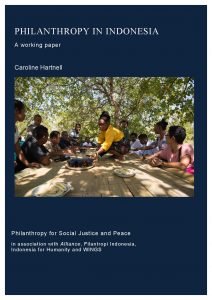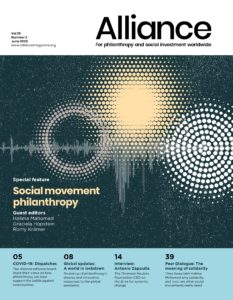Just before Christmas last year I found myself with a very small and unsure group of ‘anti-CAA’ protestors outside a public park in Jaipur. We weren’t certain if we had the permission to gather and protest, who was really in charge or what we were going to do. Someone said we could gather but only in silent protest. We could not hold up our protest banners with the subversive slogans in which we were invested because those messages were an assertion of our agency.
This was absurd and unacceptable and it changed very quickly as seasoned activists from PUCL – the largest human rights organisation in the country, striving to defend civil liberties and human rights – joined us. Within a matter of minutes, calls were made, permissions were acquired, we moved to a visible venue and slogans of ‘inquilab’ (revolution) and ‘azaadi’ (freedom) echoed, lifting everyone’s spirit and our determination to protect the secular nature of our democracy. We were a small part of nationwide protests in India against the Citizenship Amendment Act (CAA), an anti-Muslim amendment to the Indian citizenship law of 1955. A crisis was unfolding and people were organising to resist in the face of police violence in many places and communal riots that killed over 50 people in February 2020 in the country’s capital.
Citizens’ resistance to autocrats, the fight for civil liberties, the idea of an equitable and inclusive society is led by civil society and is built on solidarity and public support. It has little or no support from institutional donors and the wealthy. This is not just true of India. An open-ended study on ‘the Role of Philanthropy in Society’ finds that the same applies in all of the countries of the study.
What else does the study tell us about philanthropy in these countries? A lot, actually. It reveals a very active and enthusiastic sector. However, even as we consider what we have learned so far about the sector, the world has changed. The coronavirus crisis now dominates everything. It has exacerbated existing inequalities and laid bare the fissures in our societies. If philanthropic actors were able to ignore this state of affairs before, they no longer can. If we are to first survive, then thrive, we can no longer afford to shy away from supporting radical changes in the world. There is consensus emerging from our consultations that we need to #BuildBackBetter, not only in these countries but across the entire globe.
The state of philanthropy in emerging markets


In addition to its strengths, the study exposes practices in philanthropy that we need to question in light of the crisis and weaknesses that we need to face. The study also demonstrates the transformative potential of philanthropy that we need to build on as we consider its responsibility in the post-crisis future.
- The study reveals a charitable impulse that is rooted historically and culturally in all of the countries in the study, perhaps with the exception of Russia (although this country notes a remarkable rise of philanthropy of many kinds since 1989). Indonesia topped the CAF World Giving Index in 2018. Takaful (solidarity or sponsorship) is an integral part of Arab societies. India is described as ‘traditionally a nation of givers’ and surveys by the Charities Aid Foundation (CAF) and the Institute for the Development of Social Investment (IDIS) show that as many as two thirds of Brazilians give regularly.
- Funding for progressive work does exist, but is limited. In all of these countries it has traditionally come from foreign funders. This source is now diminishing or, as in the case of Russia, inaccessible (or very risky when accessible). Is the burden of funding for progressive causes being picked up by local donors? The answer is – not really. Restrictive legal and political environments in these countries make this work risky. However, a few exceptions exist everywhere. In Russia foundations are still working in traditional areas but ‘in an interesting, progressive way’ and even extending support to civil society. India and Indonesia have a handful of locally based progressive funders (some of whom are, in turn, supported by foreign donors) who are supporting grassroots activists and local civil society. Brazil has had perhaps the most success in terms of creating a more progressive movement within philanthropy particularly owing to the Philanthropy Network for Social Justice that now has ten members.
- All of the countries have witnessed a recent rise in the number of High Net Worth Individuals (HNWIs) – a marker of widening inequality and the precursor of big private philanthropy. Not surprisingly then one of the major developments in emerging market countries has been the rise of corporate philanthropy, which, the study notes tends to shy away from anything that will bring the companies in question into conflict with the state. Other emerging trends such as impact investing and funding for social enterprises are also propelled by opportunities resulting from rising income inequalities to provide products and services for a burgeoning low and moderate-income class neglected by both the state and the private sector.
- Common to all country papers emerging from the study is a mistrust of NGOs by donors who see civil society as unaccountable or who are ignorant of what NGOs do (as in Brazil). This inhibits many sources of funding for civil society and grassroots work.
- Individual giving holds promise both as a force for change and as a leveller in philanthropy. While most of this giving goes to traditional causes, its effects are potentially transformative with successful examples of crowdfunding campaigns in Russia and the Arab region for advocacy work and the success of social movements in India that hinged entirely on public support. In Brazil and Indonesia, where there is little support for rights-based work in general, hope lies in the younger generation who show more willingness to support progressive causes. ‘If we seek a more equal and just society, giving by ordinary individuals with modest or even low incomes is surely where the future lies’ concludes Caroline Hartnell. In addition, the act of giving by an individual validates the cause to which they give and in doing so democratises philanthropy.
- Another promising field in emerging market countries is community philanthropy. Immensely successful in Russia with over 70 community foundations, showing promise in Brazil and developing in the other countries, its potential as an agent of social change lies in the fact that in the broadest sense, it represents the use by communities of their own resources to improve the quality of their life. Thus, local ownership of solutions, local leadership in change processes, investment of local assets – all the essential ingredients of sustainable development are present here.
The crisis
For many, COVID-19 is simply the culmination of a series of crises. India and Brazil have seen the dismantling of their democratic values. The CIVICUS Monitor grades the countries in our study as either ‘closed’ ‘repressed’ or ‘obstructed’. Most of these countries suffer from extreme inequalities. Each country competes with the others in the desperate state of their distribution of wealth. Brazil’s six richest men and Indonesia’s four richest men have the same wealth as the poorest 100 million people in each of those two countries. In India, the richest one per cent hold more than four times the wealth held by 953 million people (70 per cent of the population). The richest three per cent of Russians own 89 per cent of all financial assets in the country.
The crisis has made things seismically worse because when a pandemic strikes an environment simmering with tensions, divisions, suppression of dissent and mounting income inequalities, its consequences are crueller. India is now witnessing the further vilification of Muslims as transmitters of the virus, misinformation propagated primarily by social media leading to further violence, rise in Islamophobia and isolation of Muslims. Another by-product of the crisis everywhere is the rise of domestic violence. The massive lack of equitable access to services – primarily health care but even water and sanitation – in many emerging market countries has shown the deficiencies of piecemeal service provision and the need for public welfare programmes. The poor are vulnerable everywhere – in the first week of the lockdown at least 17 migrant labourers in India lost their lives in an attempt to return home to various parts of the country from big cities where they work. In Brazil too, Ana Valeria Araujo of the Brazil Human Rights Fund wonders, ‘what happens when the disease hits the favelas inhabited by the poorest people in the country with no access to health care?’ Similar concerns arise about the state of refugees in the Arab region and the poor in Indonesia.
Furthermore, the crisis threatens to undermine a rights-based narrative. ‘The narrative now is just about rebuilding the economy and fighting poverty. I’m very worried that the disease will be used as a smoke screen to allow for flexibility with deforestation and the invasion of indigenous lands. Now saving people from poverty undermines everything,’ says Ana Valeria Araujo. Speaking of the Arab region Atallah Kuttab of SAANED too despairs, ‘social justice is an indigenous term, but in response to the crisis, the rights of people have not been taken into consideration.’
Philanthropy for a better future
A pandemic ‘fast forwards historical processes’ notes Yuval Noah Harari. This is already visible in many spheres. Some fast-forwards are good such as philanthropic institutions making their donations unrestricted, but some make you wary – increased state surveillance, side-tracking of environmental measures to protect the economy or funders withdrawing long-term funding from civil society partners to set up emergency response funds to the crisis. Some of these changes will not be easy to put back in the bag after the crisis passes so what we do now, what we give up and the new ways of acting that we adopt, matter.
In the countries of PSJP’s study (and elsewhere too), there has been an outpouring of solidarity from donors of all kinds. Many big donations from wealthy individuals and institutions are going to government appeals to support relief measures and yet there are millions who aren’t benefiting from state support packages. The gaps are being filled by civil society organisations rooted in communities that are sometimes even outdoing the state in rapid response measures. The emergency basic income for unemployed and informal workers of R$600 per month for a period of three months was approved by the Brazilian congress following a massive civil society campaign launched on 20th March.
The crisis is an opportunity to turn the perception of civil society as untrustworthy or unaccountable on its head as NGOs prove themselves key pillars of our societies in these uncertain times. In India, some of the more progressive philanthropists have issued a joint appeal to corporate foundations and other philanthropic organisations for unrestricted grantmaking and support to civil society partners. In Russia, Vladimir Potanin has doubled the fund of the Vladimir Potanin Foundation, adding one billion roubles to support the non-profit sector and their beneficiaries. Perhaps this can be a starting point for the shift in philanthropy’s view of civil society and the beginning of helping to build a stronger and resilient version of it. After all, it is now amply clear that the role played by local civil society is one of the good things about this time.
However, philanthropy needs to first transform itself. In recent years, a movement in philanthropy and the development aid system to do things differently has been building, finding its most prominent expression in the #ShiftThePower campaign that calls on all social change agents to embrace a vision of a ‘good society’ based on dignity, solidarity, equality, democracy, sustainability and agency, among others. It is now time to accelerate this call for radical change.
As we move into the second phase of the ‘The Role of Philanthropy in Society’ project, PSJP’s goal will be to support this growing movement for radical change in philanthropy and to #BuildBackBetter. In order to fast-track the emergence of a new system we want to bring together visionary thinkers about the nature of a good society and the progressive funders like those noted above, and we will need to tap into the potential of alternative ways, like community philanthropy and individual giving, of resourcing change.
In order to do this, we will reach out to a wide range of partners. If you would like to participate in these conversations or share ideas about the role of philanthropy in the post coronavirus world, please respond here or write to us at info@psjp.org. We would love to hear from you!
Chandrika Sahai is the coordinator of Philanthropy for Social Justice and Peace. This piece was written with input from Maria Chertok, Ana Valeria Araujo, Atallah Kuttab, Jenny Hodgson, and Barry Knight.
This piece first appeared on Philanthropy in Focus on 29 April 2020.
Mass citizen action through social movements and other popular forms of organising are a defining feature of our times fundamentally changing our civic space. Yet, institutional philanthropy has often been missing in action either unable or unwilling to engage and, when it does, met with concerns about the distorting effect of its resources and practices.
Alliance magazine’s coverage of social movements is the focus of our June 2020 issue. The issue investigates how institutional philanthropy can make itself relevant to the needs of social movements by deepening their understanding of movements and discovering appropriate ways to engage. To read the June 2020 issue and more coverage of philanthropy, you can purchase a subscription to Alliance magazine, currently half price.




Comments (0)